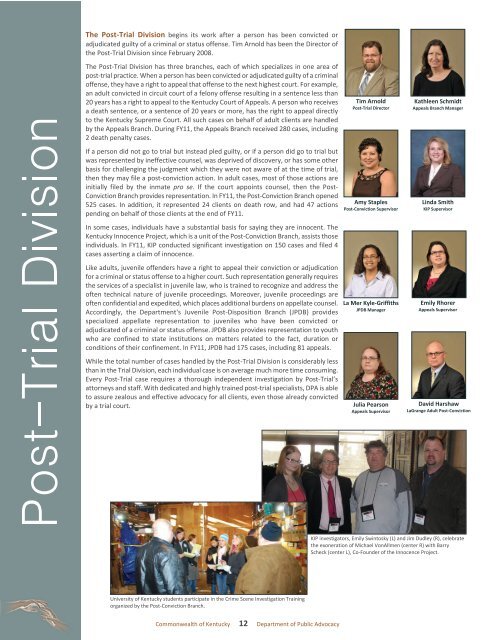DPA 2011 Annual Report - Department of Public Advocacy
DPA 2011 Annual Report - Department of Public Advocacy
DPA 2011 Annual Report - Department of Public Advocacy
Create successful ePaper yourself
Turn your PDF publications into a flip-book with our unique Google optimized e-Paper software.
The Post-Trial Division begins its work after a person has been convicted or<br />
adjudicated guilty <strong>of</strong> a criminal or status <strong>of</strong>fense. Tim Arnold has been the Director <strong>of</strong><br />
the Post-Trial Division since February 2008.<br />
The Post-Trial Division has three branches, each <strong>of</strong> which specializes in one area <strong>of</strong><br />
post-trial practice. When a person has been convicted or adjudicated guilty <strong>of</strong> a criminal<br />
<strong>of</strong>fense, they have a right to appeal that <strong>of</strong>fense to the next highest court. For example,<br />
an adult convicted in circuit court <strong>of</strong> a felony <strong>of</strong>fense resulting in a sentence less than<br />
20 years has a right to appeal to the Kentucky Court <strong>of</strong> Appeals. A person who receives<br />
a death sentence, or a sentence <strong>of</strong> 20 years or more, has the right to appeal directly<br />
to the Kentucky Supreme Court. All such cases on behalf <strong>of</strong> adult clients are handled<br />
by the Appeals Branch. During FY11, the Appeals Branch received 280 cases, including<br />
2 death penalty cases.<br />
If a person did not go to trial but instead pled guilty, or if a person did go to trial but<br />
was represented by ineffective counsel, was deprived <strong>of</strong> discovery, or has some other<br />
basis for challenging the judgment which they were not aware <strong>of</strong> at the time <strong>of</strong> trial,<br />
then they may file a post-conviction action. In adult cases, most <strong>of</strong> those actions are<br />
initially filed by the inmate pro se. If the court appoints counsel, then the Post-<br />
Conviction Branch provides representation. In FY11, the Post-Conviction Branch opened<br />
525 cases. In addition, it represented 24 clients on death row, and had 47 actions<br />
pending on behalf <strong>of</strong> those clients at the end <strong>of</strong> FY11.<br />
In some cases, individuals have a substantial basis for saying they are innocent. The<br />
Kentucky Innocence Project, which is a unit <strong>of</strong> the Post-Conviction Branch, assists those<br />
individuals. In FY11, KIP conducted significant investigation on 150 cases and filed 4<br />
cases asserting a claim <strong>of</strong> innocence.<br />
Like adults, juvenile <strong>of</strong>fenders have a right to appeal their conviction or adjudication<br />
for a criminal or status <strong>of</strong>fense to a higher court. Such representation generally requires<br />
the services <strong>of</strong> a specialist in juvenile law, who is trained to recognize and address the<br />
<strong>of</strong>ten technical nature <strong>of</strong> juvenile proceedings. Moreover, juvenile proceedings are<br />
<strong>of</strong>ten confidential and expedited, which places additional burdens on appellate counsel.<br />
Accordingly, the <strong>Department</strong>'s Juvenile Post-Disposition Branch (JPDB) provides<br />
specialized appellate representation to juveniles who have been convicted or<br />
adjudicated <strong>of</strong> a criminal or status <strong>of</strong>fense. JPDB also provides representation to youth<br />
who are confined to state institutions on matters related to the fact, duration or<br />
conditions <strong>of</strong> their confinement. In FY11, JPDB had 175 cases, including 81 appeals.<br />
While the total number <strong>of</strong> cases handled by the Post-Trial Division is considerably less<br />
than in the Trial Division, each individual case is on average much more time consuming.<br />
Every Post-Trial case requires a thorough independent investigation by Post-Trial’s<br />
attorneys and staff. With dedicated and highly trained post-trial specialists, <strong>DPA</strong> is able<br />
to assure zealous and effective advocacy for all clients, even those already convicted<br />
by a trial court.<br />
University <strong>of</strong> Kentucky students participate in the Crime Scene Investigation Training<br />
organized by the Post-Conviction Branch.<br />
Commonwealth <strong>of</strong> Kentucky 12 <strong>Department</strong> <strong>of</strong> <strong>Public</strong> <strong>Advocacy</strong><br />
Tim Arnold<br />
Post-Trial Director<br />
Amy Staples<br />
Post-Conviction Supervisor<br />
La Mer Kyle-Griffiths<br />
JPDB Manager<br />
Julia Pearson<br />
Appeals Supervisor<br />
Kathleen Schmidt<br />
Appeals Branch Manager<br />
Linda Smith<br />
KIP Supervisor<br />
Emily Rhorer<br />
Appeals Supervisor<br />
David Harshaw<br />
LaGrange Adult Post-Conviction<br />
KIP investigators, Emily Swintosky (L) and Jim Dudley (R), celebrate<br />
the exoneration <strong>of</strong> Michael VonAllmen (center R) with Barry<br />
Scheck (center L), Co-Founder <strong>of</strong> the Innocence Project.


